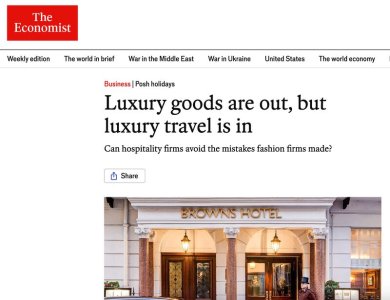WWD
EXCLUSIVE: Why Luxury Brands Can No Longer Afford to Ignore Gen X
For this demographic entering its peak spending decade, luxury is about personal fulfilment rather than social status, according to an OpinionWay survey for Publicis Luxe.
ByJOELLE DIDERICH
NOVEMBER 19, 2025, 1:00AM
Many Gen X luxury consumers prize experiences above products. YANA ISKAYEVA/GETTY IMAGES
PARIS — Optimistic, resilient, independent and hedonistic: sandwiched between Baby Boomers and Millennials, Gen X is the generation that luxury brands can no longer afford to ignore, according to a new study published Wednesday.
This cohort, born between 1965 and 1980, is at the peak of its professional achievement and spending power — yet it remains an underexplored demographic.
That’s in part because Gen X has always resisted being labeled and discussed, but this lack of understanding represents a missed opportunity for luxury brands, said Publicis Luxe.
The creative agency joined forces with market research firm OpinionWay to do a deep dive into this generation’s relationship with luxury, via a survey of 1,150 people aged 45 to 65 in the top 10 percent of affluent households in France, the U.S., the United Arab Emirates and
China.
The report, shared exclusively with WWD, found that with the exception of
China, luxury is predominantly perceived as a source of private fulfillment, rather than a marker of social success.
“The study reveals that more than half of Gen Xers in the U.S., UAE and France buy luxury items for personal pleasure, not social recognition — undermining decades of
marketing strategy built around exclusive access and conspicuous consumption,” Publicis Luxe said.
Few of the respondents actually identify as Gen X. While 57 percent in the U.S. said they were familiar with the label and could relate to it, the proportion dropped to just 27 percent in China and 32 percent in France.
Contrary to the disaffected characters in Douglas Coupland’s seminal novel “Generation X: Tales for an Accelerated Culture” and cult ‘90s movies like “Reality Bites,” the majority of those polled were closer in spirit to the cast of “Friends,” the ultimate Gen X TV show.
Asked to describe themselves, 55 percent in China and 40 percent in the UAE said “optimistic.” In France, the most popular adjective was “curious” and in the U.S., the preferred term was “resilient” — reflecting a generation that has navigated the digital revolution and is comfortable with change.
The findings suggest many of this cohort have grown out of grunge and into a quiet confidence — though they still don’t need status symbols for external approval. Asked what they might have wanted to be in another life, a quarter of respondents in the U.S. and 22 percent in France said they would choose to remain themselves.
Emotionally Engaged
Joachim Schweier, senior
marketing communications manager at the Dolder Grand Hotel in Zurich,
said that contrary to younger generations, Gen Xers are discreet but demanding customers, with zero FOMO.
“They don’t compare themselves to others. They’re self-focused,” said Schweier, one of several luxury executives interviewed for the report.
“They want spotless quality. They’ll pay for it — but it has to be perfect.”
Perceptions of luxury vary widely across regions. In France, it is closely equated with traditional craftsmanship and heritage, while in the U.S., wellness and experiences are prized above everything. The UAE and China, meanwhile, prioritize material and aesthetic luxury.
While many associate luxury with travel, being free to do what you want and express your opinions is equally important, across all geographic regions.
Preferences for types of luxury vary across countries, with 49 percent of French respondents leaning toward “discreet, exclusive” luxury, while a third of those surveyed in the U.S. favor “sophisticated, timeless luxury.” Bold luxury draws 16 percent in the UAE and China, far above the U.S. (4 percent) and France (8 percent).
A fifth of Emiratis also express a preference for “committed, responsible” luxury — a sharply higher percentage than elsewhere.
Their consumption patterns reflect their aspiration for ethical luxury, with 20 percent regularly purchasing secondhand luxury goods, ahead of China with 11 percent, France with 6 percent, and the U.S. with 4 percent. In China, 48 percent of respondents said they prefer to buy new.
Nicola Lavelle, director of digital marketing and communications for Guerlain in the Middle East, Indian Subcontinent and Africa (MEISA) region, described this generation as deeply loyal,
emotionally engaged with legacy brands, and highly responsive to personal, humanized luxury experiences.
“We treat them like influencers or brand ambassadors. When you do that, you really get their passion and loyalty,” she said, noting that GenXers account for 85 percent of the beauty brand’s revenues in the region.
While 47 percent of those surveyed in China saw aging as an opportunity, 45 percent in France said they felt more ambivalent — a tendency that also dominated in the U.S. and UAE.
Seeing Green
But the OpinionWay survey for Publicis Luxe debunked several other stereotypes.
For instance, ecological awareness is high among this generation, particularly in the UAE (94 percent) and China (89 percent) where the vast majority of consumers are ready to pay more for luxury goods and services that align with environmental values.
And while around half of Gen Xers said they are selective in their adoption of new technologies, this varies widely between East and West, suggesting brands need to tailor their social media strategies to local audiences. For instance, 47 percent of respondents in the UAE report being active on TikTok, versus just 15 percent in France.
Another reason to pay closer attention to Gen X’s attitude toward wealth is that this cohort is about to come into a fortune.
In the United States alone, Gen Xers are expected to inherit $39 trillion by 2048, in what has been described as the greatest wealth transfer in history, according to Cerulli Associates, a research firm specializing in asset management and distribution trends.
Asked how they would spend a windfall, only a small proportion would opt for personal luxury items like clothing or cars, with the exception of China, where 40 percent would splash out for themselves. Instead, most would invest the money or spend it on exclusive experiences.
“Now, as Gen X enters its peak spending decade, brands that recognize this shift stand to capture a demographic with both the means and motivation to invest in premium experiences, and which has nothing to prove,” Publicis Luxe said.
“Those that fail to adapt risk losing a generation of high-value customers who view aging as a period of possibility, freedom and self-expression — in other words, the ultimate luxury experience.”

 🤭
🤭 






